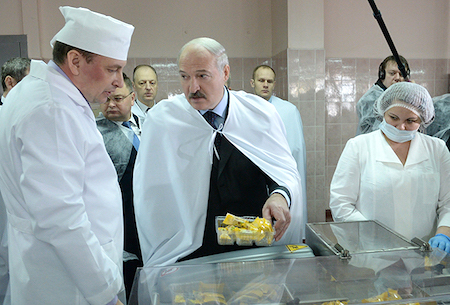Marc Abrahams's Blog, page 276
April 7, 2016
No more disheveled kilts? (new patent)
Attention kilt wearers! Does your kilt sometimes look, well . . . wrinkled, matted or otherwise disheveled? Is it hanging properly? If not, help is at hand from inventor Joseph E. Austin of Las Vegas, US.
“
Like other garments, kilts have been stored and hanged using conventional hangers. Unfortunately, kilts are not like other garments and thus they have suffered from the inadequacies of conventional hangers. Using a conventional hanger results in a wrinkled, matted or otherwise disheveled kilt. Moreover, hanging a kilt and its accessories on one or more hangers can be difficult and cause the kilt accessories to be misplaced.”
The ‘Kilt Hanger’ makes strides towards resolving such inadequacies.
“A method of hanging a kilt according to one embodiment of the present invention comprises: folding a kilt into thirds forming three panels; suspending a first kilt panel from a first pair of clasps supported by a center horizontal member; and suspending a second and third kilt panel from a second and third pair of clasps supported by outer horizontal members.“
Note too that:
“A vest and jacket can also be placed on the kilt hanger along with a fly plaid that is draped over an optional horizontal dowel member.”
Also see: from Improbable Associate Dr. Erwin J.O. Kompanje, Assistant professor of Clinical Ethics, Clinical Ethicist Department of Intensive Care and Department of Ethics and Philosophy of Medicine at the Erasmus MC University Medical Center Rotterdam – Honorary curator Mammals at the Natural History Museum Rotterdam, the Netherlands, ‘Therapeutic use of the Scottish kilt’.

April 6, 2016
Pecker Bang Analysis — Woodpeckers and Hammers [Podcast 58]
Woodpeckers and hammers — and the relationship of woodpeckers and hammers — dominate this week’s Improbable Research podcast.
SUBSCRIBE on Play.it, iTunes, or Spotify to get a new episode every week, free.
This week, Marc Abrahams —with dramatic readings by Daniel Rosenberg — tells about:
Woodpecker-like hammers — Vincent, Julian F. V., Mehmet Necip Sahinkaya, and W. O’Shea (2007). ‘A Woodpecker Hammer.’ Proceedings of the Institution of Mechanical Engineers, Part C, Journal of Mechanical Engineering Science 221 (10): 1141–7. / .
 Hammer-like woodpeckers — “Cure for a Headache,” Ivan R Schwab, British Journal of Ophthalmology, vol. 86, 2002, p. 843.
Hammer-like woodpeckers — “Cure for a Headache,” Ivan R Schwab, British Journal of Ophthalmology, vol. 86, 2002, p. 843.Splitting the bill at a restaurant — “The Inefficiency of Splitting the Bill,” Uri Gneezy, Ernan Haruvy and Hadas Yafe, The Economic Journal, vol. 114, April 2004, pp. 265–280.
The mysterious John Schedler or the shadowy Bruce Petschek perhaps did the sound engineering this week.
The Improbable Research podcast is all about research that makes people LAUGH, then THINK — real research, about anything and everything, from everywhere —research that may be good or bad, important or trivial, valuable or worthless. CBS distributes it, on the CBS Play.it web site, and on iTunes and Spotify).

April 5, 2016
Water flea waltz
April 4, 2016
President Lukashenko and the power of his Ig Nobel Prize
The Belarus Digest reports (on April 4, 2016):
“There are permanent rumours within the Belarusian establishment that the main reason for Lukashenka’s peace initiatives was the awarding of the Nobel Peace Prize to US president Barack Obama in October 2009. Lukashenka is rumoured to have given orders to the Ministry of Foreign Affairs to ‘win’ the Nobel Peace Prize for him.
 “However, the apparent lack of Belarusian capacity to influence the process, deteriorating relations with the West after the presidential elections in December 2010, the economic crisis of 2011 and Lukashenka’s receipt of the parody Ig Peace Nobel Prize in 2013 definitely cooled the president’s ambitions.”
“However, the apparent lack of Belarusian capacity to influence the process, deteriorating relations with the West after the presidential elections in December 2010, the economic crisis of 2011 and Lukashenka’s receipt of the parody Ig Peace Nobel Prize in 2013 definitely cooled the president’s ambitions.”
That 2013 Ig Nobel Peace Prize was awarded to Alexander Lukashenko, president of Belarus, for making it illegal to applaud in public, AND to the Belarus State Police, for arresting a one-armed man for applauding.
Here is an official Presidential photo of President Lukashenko, fastened to a mustache, and surrounded by admirers:

Trumping Preemption (and A Closer Look at Trumping)
 Back in 2000, Jonathan Schaffer, who is Distinguished Professor of Philosophy at Rutgers, The State University of New Jersey, US, published the first paper to examine the concept of ‘Trumping Preemption’ in: The Journal of Philosophy, Vol. 97, No. 4, Special Issue: Causation. (Apr., 2000), pp. 165-181.
Back in 2000, Jonathan Schaffer, who is Distinguished Professor of Philosophy at Rutgers, The State University of New Jersey, US, published the first paper to examine the concept of ‘Trumping Preemption’ in: The Journal of Philosophy, Vol. 97, No. 4, Special Issue: Causation. (Apr., 2000), pp. 165-181.
“Imagine that it is a law of magic that the first spell cast on a given day match the enchantment that midnight. Suppose that at noon Merlin casts a spell (the first that day) to turn the prince into a frog, that at 6:OOpm Morgana casts a spell (the only other that day) to turn the prince into a frog, and that at midnight the prince becomes a frog. Clearly, Merlin’s spell (the first that day) is a cause of the prince’s becoming a frog and Morgana’s is not, because the laws say that the first spells are the consequential ones.”
 The idea of Trumping Preemption has now received further consideration in a 2015 paper for the journal Acta Analytica. Its author, Sara J. Bernstein, who is Assistant Professor of Philosophy at Duke University, takes ‘A Closer Look at Trumping’ in: Acta Analytica, March 2015, Volume 30, Issue 1, pp. 41-57.
The idea of Trumping Preemption has now received further consideration in a 2015 paper for the journal Acta Analytica. Its author, Sara J. Bernstein, who is Assistant Professor of Philosophy at Duke University, takes ‘A Closer Look at Trumping’ in: Acta Analytica, March 2015, Volume 30, Issue 1, pp. 41-57.
“According to Schaffer (2000a), ‘trumping preemption’ is a category of redundant causation distinct from early and late preemption and from overdetermination. I show that the putative causal difference between causal processes in cases thought to be trumping preemption generates early preemption or overdetermination rather than trumping.”
BONUS etymology: Trump
Trump (verb) [1] “fabricate, devise,” 1690s, from trump “deceive, cheat” (1510s), from Middle English trumpen (late 14c.), from Old French tromper “to deceive,” of uncertain origin. And:
Trump (verb) [2] “surpass, beat,” 1580s. Also:
Trump (verb) [3] “to break wind,” colloquial, UK. Orig. unk., prob. onomatopoeic.

April 2, 2016
The undertaker and the switchboard
Here’s how the 99% invisible blog begins explaining telephone switching systems:
If you are an undertaker in 1878 Kansas City, and you learn that your competitor’s wife works as a telephone switchboard operator and has been diverting business calls meant for you to her husband, you have three potential courses of action:
(1) Contact the telephone company and try to get the operator fired.
(2) Take the operator and her husband to civil court and try to sue for damages.
(3) Revolutionize the entire telephone system by inventing an automatic telephone switching system that allows people to dial each other directly, thereby eliminating any need for a telephone switchboard operator.
Almon Brown Strowger [pictured here] went with (3)….
BONUS: Two of Strowger’s several switchboard patents: 1 and 2

April 1, 2016
Can (or should) Ostriches Eat Horseshoes?
The idea that ostriches are partial to eating horseshoes goes back a long way. Hundreds of years in fact. See this 14th century depiction of a horseshoe (and nail) Struthioniforme mealtime. But can the birds actually eat and digest them?
Over the centuries, several experiments have been performed to find out, and some are recounted in an article by researcher Thierry Buquet for the Medieval Animal Data-Network in their research blog MAD.hypotheses.
“The oldest such experiment I have found appears in an Arabic context and dates from the ninth century. The great al-Ğahiz relates this experiment in his Kitāb al-hayawān (Book of Animals). After having proven that the ostrich stomach cannot melt rocks with its supposedly burning belly, al-Ğahiz relates the following experiment that had been told to him. One day, two scholars threw burning embers to an ostrich that swallowed them without hesitation. After that, they threw burning stones and the bird swallowed them too. Going further, they heated small bits of metal, and the ostrich ate those as well (what an appetite!). The two scholars were quite incredulous and wanted to check whether the ostrich was really able to digest this metal, even though they had to sacrifice the bird by opening up its belly.”
Read on: Fact Checking: Can Ostriches Digest Iron?
Note regarding the illustration: Bas-de-page scene of a man feeding horseshoes and nails to an ostrich. The Queen Mary Psalter, 1310-1320. London, British Library, Ms Royal 2B vii, f. 114r
Safety note: Those involved with ostriches should not attempt to feed them horseshoes or any other metal items. In case of accidental ingestion of iron objects (by an ostrich) you might seek the help of a professional veterinarian practised in the use of cow magnets (rather than horseshoe magnets).

March 31, 2016
The Presence of the Absence of Absences
 Although it’s possible to create a swathe of specially crafted ‘academic drivel’ on the concept of the Absence of Absences that certainly doesn’t preclude the concept from serious study.
Although it’s possible to create a swathe of specially crafted ‘academic drivel’ on the concept of the Absence of Absences that certainly doesn’t preclude the concept from serious study.
In fact there’s quite a body of academic work which addresses this very subject – see for example the work of George Botterill (University of Sheffield, UK) [pictured] and Dr. Jane Suilin Lavelle (University of Edinburgh, UK) who look at the philosophical implications of absences and omissions, and whether (or not) they can genuinely be causally efficacious.
“[…] we think that energy in general is subject to a principle of conservation, and that an effect cannot just spring into existence out of nothing. The problem is sometimes presented in a colourful way by saying that mere absences lack the ‘oomph’, or ‘biff’, required for causal production. We will refer to this as the potency difficulty.”
For specific references, see section 6, ‘Nominals and Indicators : the absence of absences’ in: The Absent Relata Problem : Can absences and omissions really be causes? [under review]
“It might be the case that absences and omissions can be cited as explanatory difference-makers in contrastive explanations, but cannot be genuine causes because absences and omissions cannot be causal relata. It is quite conceivable that the folk should fail to abide by a subtle philosophical distinction between causation proper and causal explanation, and, being accustomed to invoke absences and omissions in explanations, loosely speak as if they could also be causes.”

March 30, 2016
The A-Through-L of Social Dilemmas [Podcast 57]
Awkward social dilemmas — specifically, those that can be listed under the letters A through L — dominate this week’s Improbable Research podcast.
SUBSCRIBE on Play.it, iTunes, or Spotify to get a new episode every week, free.
This week, Marc Abrahams —with dramatic readings by Robin Abrahams — tells about:
Awkward Social Dilemmas — Etiquette , by Emily Post, 1922. [BONUS: Podcast listener C.J. Crittenden wrote in, alerting us to this 1933 Emily Post column about one of the items mentioned in the podcast: the “Jack Horner shelf of welcome”.]

The mysterious John Schedler or the shadowy Bruce Petschek perhaps did the sound engineering this week.
The Improbable Research podcast is all about research that makes people LAUGH, then THINK — real research, about anything and everything, from everywhere —research that may be good or bad, important or trivial, valuable or worthless. CBS distributes it, on the CBS Play.it web site, and on iTunes and Spotify).

March 29, 2016
Press Release of the Week: Psychotherapy for Depressed Rats
This week’s Press Release of the Week carries the headline: “Psychotherapy for depressed rats shows genes aren’t destiny“.
Issued by Northwestern University, the press release begins by saying:
CHICAGO — Genes are not destiny in determining whether a person will suffer from depression, reports a new Northwestern Medicine study. Environment is a major factor, and nurture can override nature.
When rats genetically bred for depression received the equivalent of rat “psychotherapy,” their depressed behavior was alleviated. And, after the depressed rats had the therapy, some of their blood biomarkers for depression changed to non-depressed levels.
“The environment can modify a genetic predisposition to depression,” said lead study investigator Eva Redei [pictured here], a professor of psychiatry and behavioral sciences at Northwestern University Feinberg School of Medicine….
(Thanks to Ivan Oransky for bringing this to our attention.)
BONUS QUESTION: If you are a psychiatrist who successfully — and on a regular basis — supplies psychotherapy to rats, we would like to hear details of your methods and of your billing rates.

Marc Abrahams's Blog
- Marc Abrahams's profile
- 14 followers






